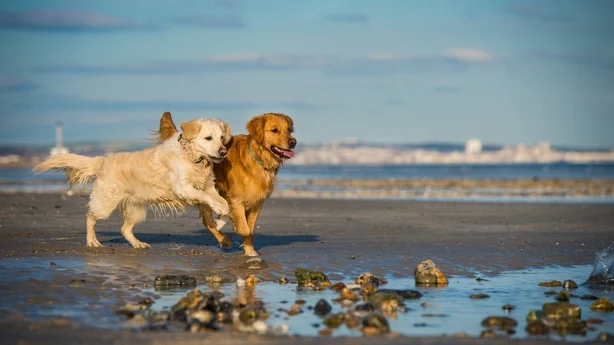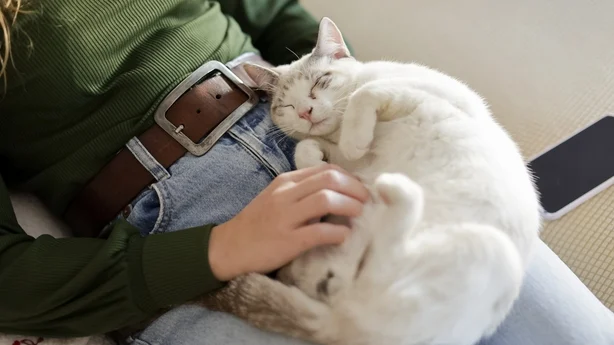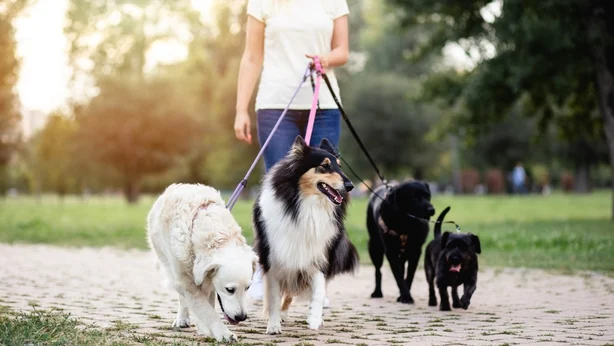Vet Sarah Boland talks to Philip Boucher-Hayes about overweight pets and how to keep companion animals healthy and happy. Listen back above.
Pets add to our health and happiness, and it's usually a pretty good deal for the pet too. Sadly, a pet’s quality of life can be undermined by weight gain and it can even lead to an early death, so says veterinary surgeon Sarah Boland.
Sarah spoke to Philip Boucher-Hayes on Today with Claire Byrne about the tell-tale signs of weight gain in pets, how it affects them and how to keep your companion animals healthy and happy.

It seems like there is a mis-match between the amount of pets that are overweight and number of owners who recognise the fact. Sarah broke down the stats:
"About 65% of pets are overweight. Now in contrast to that, only about 20% of owners would view their pets as being overweight."
People have ways of avoiding the problem, Sarah says. With the longer-haired animal companions, it's often a case of out of sight, out of mind:
"A lot of people say 'Oh, it’s just their hair!’"
So, how can you diagnose weight gain in your dog or cat? The best way is hands-on, Sarah suggests: "The best thing to do is actually to feel your pet. You should be able to feel their ribs and their spine."
If you find yourself digging through layers of tissue before you come to their bony parts, you have a problem, the vet says.

It also varies from pet to pet, depending on their coat: "If you have a smoother-coated pet, when you look at them from above, they should be an hourglass shape – so wider at the ribs and hips and go in a little bit at the middle, and when you look at them at the side from their ribs to their groin, they should tuck up."
With cats, it’s the side profile that’s the give-away. Sarah says you can often feel their ribs quite easily when you hold them, even if they are an unhealthy weight:
"You can very often feel the ribs of a fat cat - they carry a lot of their weight around the middle. It’ll be that side profile that you see the change in your cat, their belly will get closer to the floor."
Over-feeding is usually the problem, even if pet owners are in denial about it and want an alternative explanation. Sarah says that occasionally there is an underlying cause of sudden changes in weight, which your vet can identify:
"There can be issues with thyroid and there can be issue there, but actually most medical illnesses in our pets cause weight loss rather than weight gain and I would say 95% of the time it is overeating."
Feeding your begging dog scraps from the table because you can't resist his pleading look is not a great idea, Sarah says. A small amount of human food is proportionately a greater amount to a pet and will cause them to put on weight:
"What we consider small amounts of food, for our pets are a lot. A lot of the foods we eat are much higher in fat than what they require and it’s very calorie dense food. They may take a moment to ‘inhale’ it, but the amount of calories they are taking in is quite high."

If pet owners develop a habit of casually feeding human food to their pets, the animals will learn to expect it. Sarah says that everyone in the household has to be on board with changing the habit as pets won’t give up that easily:
"Habits are difficult. I’ve seen people, they don’t even notice themselves put their hand down to give the dog or cat something. I also understand that pets can become quite vocal and quite demanding if they’re used to getting it."
Sarah has some suggestions for how to slim down an overweight pet:
- Feed your pet from a ‘puzzle feeder’; a food dispenser which is designed to give the cat or dog a task or a problem to solve in order to release the food.
- Use the puzzle feeder while the humans are eating, so the pet is mentally occupied and thus less likely to use their pester-power to beg for human food.
- Slow down the rate at which your pet metabolises their food by using vet-recommended diet foods, which are usually dry. These make the pet feel fuller for longer.
Tackling weight gain in a pet pays dividends, Sarah says. In fact, it will make all the difference to your pet’s health and happiness, as being overweight has serious health implications:
"It reduces lifespan, but it also reduces quality of life. So having your pet slim is definitely one of the kindest things you can do, even though at the time when you are denying them those treats they’re used to, you might feel like it’s a harsh thing. In the long run, it’s a kindness."
You can listen back to clips and full shows from Today with Claire Byrne here.
Disclaimer: The copyright of this article belongs to the original author. Reposting this article is solely for the purpose of information dissemination and does not constitute any investment advice. If there is any infringement, please contact us immediately. We will make corrections or deletions as necessary. Thank you.






